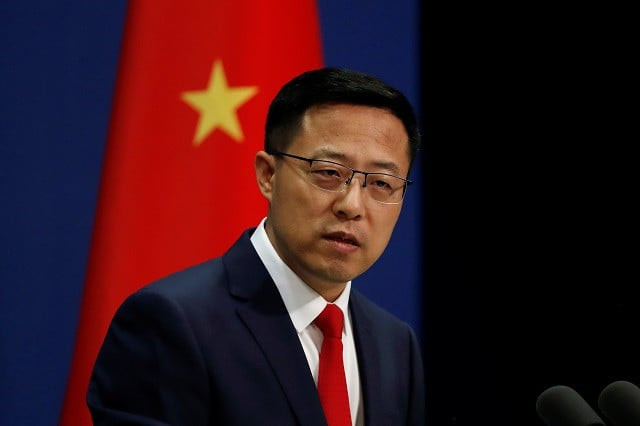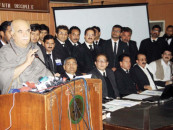China urges Pakistan, India to launch probe into airspace violation incident
India’s ‘accidental’ missile fire into Pakistan raises questions and concerns, say analysts

Beijing on Monday called on Islamabad and New Delhi to launch a thorough investigation into the incident of violation of Pakistani airspace and establish a notification mechanism in time to prevent the recurrence of such incidents and miscalculations.
“Pakistan and India both of them are important countries in South Asia and they share the responsibility to uphold the regional security and stability,” Chinese Foreign Ministry Spokesperson Zhao Lijian said during his regular briefing in repose to a question regarding unprovoked violation of Pakistan’s airspace by India.
“We call on relevant countries to have dialogue and communication as soon as possible and launch a thorough investigation into this incident, strengthen information sharing and establish a notification mechanism in time to prevent the recurrence of such incidents and miscalculations,” he added.
Read more: China steps in for political, economic stability in Pakistan
Earlier, a Chinese former defence attache on South Asian countries asked the world community to probe Indian so-called clarification on supersonic projectile crash into Pakistani territory.
He pointed out that what excuse India may find, this was the unprovoked violation of Pakistani airspace, which should be strongly condemned.
Zhao Lijian also said that the Chinese side had noted the information regarding the airspace violation incident. “We have noted the relevant information,” he said when asked to comment on the incident.
Pakistan had strongly protested and condemned last week’s violation of its airspace by a supersonic flying object of Indian origin.
Pakistan has also called for a thorough and transparent investigation of the incident which reflected India’s disregard for air safety and regional peace and security.
Many questions
One of China’s prestigious English language newspaper Global Times, quoting analysts, reported that India’s other neighbouring countries including China should also be concerned about its lack of effective security protocols or technical safeguards, as this could potentially lead to unexpected consequences under complex situations.
Pakistan’s Foreign Office said in a statement on Saturday that this serious matter cannot be addressed with the simplistic explanation proffered by the Indian authorities, and Pakistan demands a joint probe to accurately establish the facts surrounding the incident.
The Pakistani demand comes after India said on Friday it had accidentally fired the missile into Pakistan on Wednesday because of a “technical malfunction” during routine maintenance, and it would hold an internal inquiry.
No casualties were caused by the accident, reports from both countries said.
The Foreign Office also listed a set of questions and issues, asking the Indian authorities to explain the measures and procedures in place to prevent accidental missile launches, and if the missile was indeed handled by its armed forces or some rogue elements are given the profound level of incompetence.
“The grave nature of the incident raises several fundamental questions regarding security protocols and technical safeguards against the accidental or unauthorised launch of missiles in a nuclearised environment,” the Foreign Office added.
A Pakistani defence analyst familiar with the matter told the Global Times on condition of anonymity that the incident has inherent risks, and it could have led to retaliation and escalation.
The Pakistani forces exercised restraint in the incident after thoroughly evaluating the situation while taking into account a number of factors, the analyst said, noting that restraint may not be the case every time.
"If the incident turns out to be indeed an accident, it is very worrisome in terms of India’s safety mechanisms that are in place for launching a missile."
He said that most worrisome is that India did not inform Pakistan immediately after firing, even if accidental, and only confirmed two days later.
"This aspect raises concerns about irresponsible behaviour, lack of professionalism in Indian armed forces and command and control of strategic weapons. It shows India is not capable to be entrusted with such weapons in name of regional and global peace," the analyst said.
The analyst said that the concern should apply not only to Pakistan but all countries neighbouring India. "What if an Indian missile accidentally landed close to the China-India Line of Actual Control? So it is a clear and persistent risk for all countries in the region," he added.
China and India just concluded the 15th round of commander level meeting on Friday, as the two sides reached a consensus on agreeing to maintain dialogue via military and diplomatic channels to reach a mutually acceptable resolution to the remaining issues at the earliest time, continuing the positive atmosphere since the 14th round of talks.
But an unintentional accident caused by India’s incapability to handle its weapons could seriously complicate the situation, experts added.
Despite India’s claims saying the incident is accidental, the Pakistani analyst said it could well be intentional, and India’s motive could be to test the response options of Pakistan’s defence systems which could be the reason probably that the Pakistan side intentionally kept some aspects of the incident vague.
"It takes a lot to fire a missile, including the aligning of the missile with fire control system, feeding it with certain parameters and more, so an accidental firing is supposed to be difficult," the analyst said.
"Accordingly, there are a lot of queries which India needs to respond to in order to clear its record."



















COMMENTS
Comments are moderated and generally will be posted if they are on-topic and not abusive.
For more information, please see our Comments FAQ